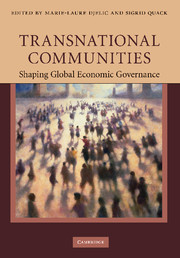Book contents
- Frontmatter
- Contents
- List of figures
- List of tables
- List of appendices
- Contributors
- Preface
- Part I Introduction
- Part II Classical communities with a transnational extension
- Part III Professional communities with a transnational extension
- Part IV Virtual communities
- 9 Gift-giving, transnational communities, and skill-building in developing countries: the case of free/open source software
- 10 Epistemic communities and social movements: transnational dynamics in the case of Creative Commons
- Part V Transnational interest- or issue-based communities
- Part VI Conclusion
- Index
- References
9 - Gift-giving, transnational communities, and skill-building in developing countries: the case of free/open source software
Published online by Cambridge University Press: 07 September 2010
- Frontmatter
- Contents
- List of figures
- List of tables
- List of appendices
- Contributors
- Preface
- Part I Introduction
- Part II Classical communities with a transnational extension
- Part III Professional communities with a transnational extension
- Part IV Virtual communities
- 9 Gift-giving, transnational communities, and skill-building in developing countries: the case of free/open source software
- 10 Epistemic communities and social movements: transnational dynamics in the case of Creative Commons
- Part V Transnational interest- or issue-based communities
- Part VI Conclusion
- Index
- References
Summary
Transnational communities and the North–South divide
Individual skills are a priority in development policies concerned with bridging the socio-economic divide between the global North and South. Increased disenchantment with the models that have dominated relations between the North and the South since the end of colonialism – whether top-down or bottom-up (Stohr 1981) – has yielded the notion that a more productive way of developing the South is to help the people living there to acquire skills and know-how (Sen 1997; Karnani 2006). While there does seem to be agreement on this, the search is still on for the most effective social formations to help close the gap, as is the quest for the mechanisms most suitable for developing the South.
Top-down and bottom-up approaches
The top-down approach to bridging the North–South divide assumes that development starts in a few dynamic sectors and geographical regions, from which it hopefully spreads to other sectors and areas (Stohr 1981), trickling down through trade, multinational corporations, and government organizations. Thus, large-scale organizations (private or government) were installed to serve as the “motor” of development in the South (Stohr 1981). Prominent in this approach are multinational corporations, conceptualized as superior repositories and vehicles for organizing knowledge, and playing an important role in transferring knowledge and skills between countries (Kogut and Zander 1993; Gupta and Govindarajan 2000).
- Type
- Chapter
- Information
- Transnational CommunitiesShaping Global Economic Governance, pp. 199 - 225Publisher: Cambridge University PressPrint publication year: 2010
References
- 1
- Cited by



